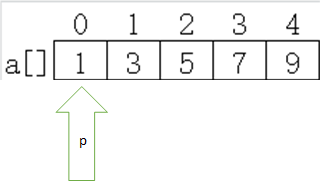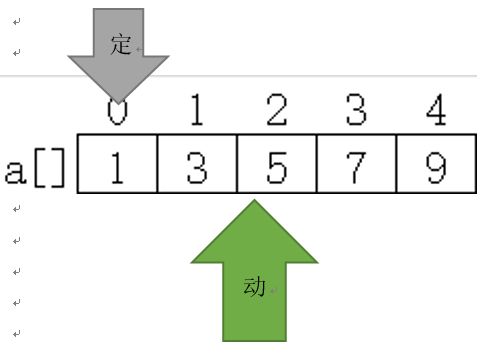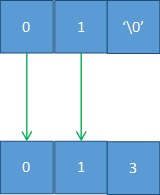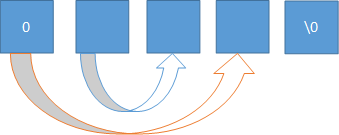C语言讲义——数组和指针
数组名表示的是这个数组的首地址。即如果有int a[10],则a 相当于&a[0]。
#include <stdio.h>
main() {
int a[5]= {1,3,5,7,9};
printf("数组a[]的地址为:%d\n",a);
for(int i=0; i<10; i++) {
printf("a[%d]的地址为:%d \n",i, &a[i]);
}
}
运行结果:
数组a[]的地址为:6487600
a[0]的地址为:6487600
a[1]的地址为:6487604
a[2]的地址为:6487608
a[3]的地址为:6487612
a[4]的地址为:6487616
a[5]的地址为:6487620
a[6]的地址为:6487624
a[7]的地址为:6487628
a[8]的地址为:6487632
a[9]的地址为:6487636
指针操作数组元素

#include <stdio.h>
main() {
int a[]= {1,3,5,7,9};
int *p = NULL;
p = a;
printf("数组名赋值给指针:%d\n", *p);
p = &a[0];
printf("指针指向数组首元素:%d\n", *p);
p = &a[2];
printf("针指向数组任意元素:%d\n", *p);
// 指针加上整数,相当于数组下标加上整数
// p+j = a[i+j]
printf("指针加上整数:%d\n", *(p+1));// a[2+1]
}
运行结果:
数组名赋值给指针:1
指针指向数组首元素:1
针指向数组任意元素:5
指针加上整数:7
指针遍历数组

#include <stdio.h>
main() {
int a[5]= {1,3,5,7,9};
int nLen = sizeof(a)/sizeof(int);
int *p=a;
int *q;
q=p;
for(p; p-q<nLen; p++) {
printf("%d ",*p);
}
}
函数封装版:
#include <stdio.h>
void printArray(int *p,int len) {
int *q = p;
for(p; p-q<len; p++) {
printf("%d ",*p);
}
printf("\n");
}
main() {
int a[5]= {1,3,5,7,9};
printArray(a, 5);
}
指针版求字符串长度
#include <stdio.h>
#include <string.h>
int myStrlen(char *s) {
int n = 0;
while(*s !='\0') {
n++;
s++;
}
return n;
}
main() {
char str1[200];
strcpy(str1,"大话西游2");
printf("%d\n", myStrlen(str1));
printf("%s", (str1));
}
指针版字符串常量
“指针版”字符串常量可像数组一样输出,不能修改,但可以直接赋值。
#include <stdio.h>
main() {
char astr[] = "hello world";// 普通字符串常量(即字符数组)
char *pstr = "hello world";// 指针版字符串常量
// “指针版”可像数组一样输出
printf("%c %c", astr[0], pstr[0]);
//X:“指针版”不能修改:pstr[0] = 'c';
astr[0] = 'c';
printf("\n %s\n", pstr);
printf("\n %s\n", astr);
//X:字符数组不能直接赋值:astr = "wellcome c";
pstr = "wellcome to c";// “指针版”可以直接赋值
printf("\n %s\n", pstr);
}
指针版字符串复制

#include <stdio.h>
void copy_str(char *strFrom , char *strTo) {
while(*strFrom != '\0') {
*strTo = *strFrom;
strTo ++;
strFrom ++;
}
*strTo = '\0';
}
main() {
char* strFrom = "一生事业总成空,\
半世功名在梦中。\
死后不愁无勇将,\
忠魂依旧守辽东。";
char strTo[200] = {0};
copy_str(strFrom, strTo);
puts(strTo);
}
字符串转置

#include <stdio.h>
#include <string.h>
main() {
char str[] = "pool";
char *p1 = str;
char *p2 = str + strlen(str) - 1;
char temp ;
while (p1 < p2) {
temp = *p1;
*p1 = *p2;
*p2 = temp;
p1++;
p2--;
}
puts(str);
}
指针数组
指针的数组。
#include <stdio.h>
main() {
char* pName[] = {"1.关胜","2.林冲","3.秦明","4.呼延灼","5.董平"};
printf("指针长度:%d \n", sizeof(char*));
printf("指针数组长度:%d \n", sizeof(pName));
int i;
for( i= 0; i<5; i++) {
puts(pName[i]);
}
puts("---------------");
char* temp = pName[0];
pName[0] = pName[4]; // 改变指向
for( i= 0; i<5; i++) {
puts(pName[i]);
}
printf("temp = %s", temp);
}
运行结果:
指针长度:8
指针数组长度:40
1.关胜
2.林冲
3.秦明
4.呼延灼
5.董平
---------------
5.董平
2.林冲
3.秦明
4.呼延灼
5.董平
temp = 1.关胜



